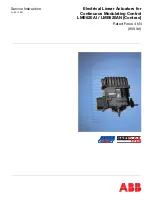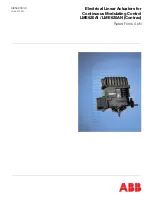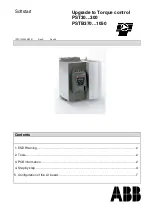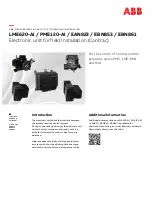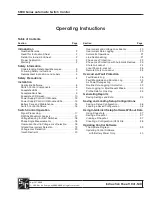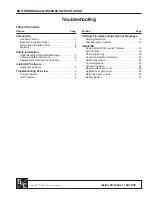
COMPONENT INSTALLATION
MI35.2005
15JAN01
If the valve is to be put near the left front tire, care
should be taken to keep it as far outboard and rearward as
possible. If mounted too close to the tire, the valve may be
struck by the tire on rough or bumpy roads or when turning.
2. MOUNTING THE VALVE
1. LOCATING THE VALVE:
valve is normally placed to the left of the driver’s seat. This
location is not vital but is most convenient. If the need arises.
the valve can be put elsewhere such as alongside the couch
or chair. Be sure to check underneath to see that the bottom
of the valve will be accessible. It is not advisable to put the
valve in a compartment or in the dash.
With the Integrated (110 Series) Valve,cut a 5" x 5-3/4" hole
at the desired location.
Before cutting the hole, be sure to check underneath for wir-
ing, structural parts, or other items that may create a pro-
lem. Also be sure to leave enough room to connect all hy-
dralic hoses.
The Separate Valve will be mounted to the bottom of the floor
using four #10 x 3/4" sheet metal screws. (On some vehicles
with thin floors, it may be necessary to shim the valve down,
or the cover plate up.) A minimum of 3/4" of floor thickness
is required. Position one end plate with seal at each end of the
valve body and secure with four #10 x 3/4" sheet-metal screws.
The Separate (100 Series) light panel may be flush mounted
in a flat surface such as the dash or may be surface mounted
on the floor or other convenient locations by using the 1.75"
tall spacer box. When surface mounting the light panel ad-
jacent to the valve be sure to leave enough clearance for the
levers to move the full extent of their travel. Drill a 1" hole be-
neath the light panel to pass the wiring through. Do not mount
the light panel until all wiring is complete. Always leave enough
wire length in the spacer box to allow lifting the panel for re-
pair. Be sure to seal the 1" hole when finished. Never flush
mount a panel in the floor. The panel must always be protect-
ed from dirt and water. When flush mounting the light panel,
a rectangular hole with 45 degree corners matching the back
of the panel will need to be cut in the mounting surface.( See
Template at the end of Part III.) There must be a minimum
clearance of 2" behind the mounting surface to allow for the
panel and the wiring. The Integrated (110 Series) Valve will
drop through the hole from the top. Secure valve and cover
plate at the same time using four #10 x 3/4" Phillips head
screws. If necessary, the sensing unit and harness may be
unplugged to ease installation. This may be done by removing
This may be done by removing the hole cover and
cover plate until sensing unit and harness are plugged in and
hole cover is replaced. Caulk around the underside of the
3. LOCATING AND MOUNTING THE PUMP
4. HYDRAULIC HOSES
Do not attach hoses or wiring to any fuel or
CAUTION:
When connecting hoses and wiring harnesses to the
kickdown jacks always check that the jack can swing from the
horizontal position to a position 45 degrees beyond the ver-
tcal position, without kinking the hose or without tight wires.
The jack must also be able to freely fold back to its stored
position.
Straight Acting Jacks:
wiring harnesses must have enough slack to allow free move-
ment of the jack.
There are different lengths of hoses to be routed to the four
leveling jacks. (Refer to the Hydraulic Hookup Diagram).
Straight Acting Jacks:
and connect it to the hose fitting. 90 degree swivel fittings are
available if needed for clearance.
IMPORTANT:
A LEAKING HOSE CAN POSE A FIRE HAZARD
A KICK DOWN JACK WILL
SWING UP ABRUPTLY WHEN IT IS RELEASED.
EXTREME CAUTION:
PART III
Can pivot several inches. Hoses and
Route the hose to the top of the jacks
On the four lever system, the
: With the Separate (100 Series)
Valve, cut a 4 1/2" x 2 1/4" hole at the desired location.
: Although it is
not always possible, it is desirable to put the pump assembly
under the hood compartment where it is easily accessible for
service or fluid check and refill. The distance of the pump from
the valve is limited by the 7’ hose provided and the battery
cable although a longer hose and cable may be used if available.
: It is important to keep the ends of
the hoses plugged during installation to prevent any dirt from
entering the system. Hoses should be routed away from any
heat emitting items such as engine or exhaust components.
a good location is along the outside of the frame rail. It may
be necessary to build a heat shield and/or adequately insul-
ate the hoses. Care should be taken to avoid sharp edges.
NOTE:
NOTE:
The pump and pump relay should be protected from direct road spray.
NOTE: Do not remove fitting caps until attaching the hose
to the valve.
screws.
valve where the box meets the floor.
unplugging sensing unit and harness. Do not secure valve and
crossmember on front control coaches.
brake lines. Do not run hoses across the transmission
existing hose end, tighten the hose end to snug plus 1/4
tighten the hose end 1/3 turn (2 FLATS). If tightening an
make the hose end snug (finger tight) on the fitting, then
Tightening of hose ends: If tightening a new hose end,
turn (1 FLAT).
















